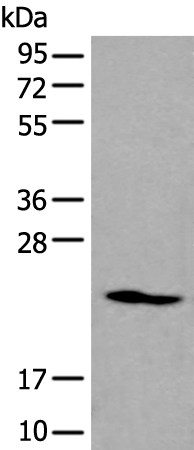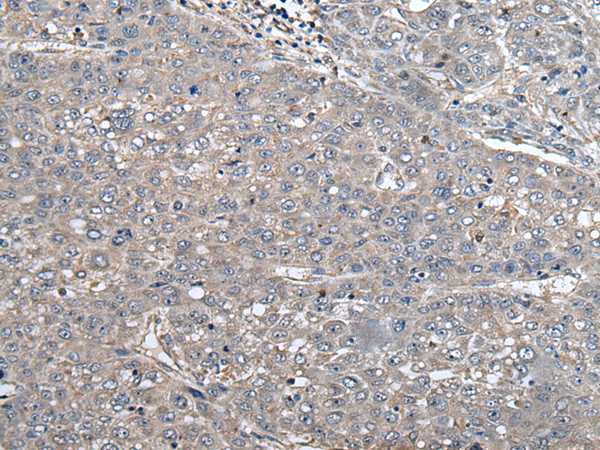

| WB | 咨询技术 | Human,Mouse,Rat |
| IF | 咨询技术 | Human,Mouse,Rat |
| IHC | 1/40-1/200 | Human,Mouse,Rat |
| ICC | 技术咨询 | Human,Mouse,Rat |
| FCM | 咨询技术 | Human,Mouse,Rat |
| Elisa | 1/5000-1/10000 | Human,Mouse,Rat |
| Aliases | ARFL1 |
| WB Predicted band size | 20 kDa |
| Host/Isotype | Rabbit IgG |
| Antibody Type | Primary antibody |
| Storage | Store at 4°C short term. Aliquot and store at -20°C long term. Avoid freeze/thaw cycles. |
| Species Reactivity | Human, Mouse, Rat |
| Immunogen | Synthetic peptide of human ARL1 |
| Formulation | Purified antibody in PBS with 0.05% sodium azide and 50% glycerol. |
+ +
以下是关于ARL1抗体的3篇代表性文献及其摘要概括:
1. **"ARL1 and membrane traffic in the Golgi apparatus"**
- **作者**: Munro S. (2001)
- **摘要**: 该研究利用ARL1特异性抗体揭示了ARL1蛋白在高尔基体膜上的定位,并证明其在维持高尔基体结构和囊泡运输中的关键作用,为后续ARL1功能研究提供了重要工具。
2. **"Interaction of ARL1 with the GBG1 complex regulates Golgi organization"**
- **作者**: Boehm M. et al. (2001)
- **摘要**: 通过ARL1抗体的免疫荧光和免疫沉淀实验,发现ARL1与GBF1蛋白复合物相互作用,调控高尔基体相关的小G蛋白活性,影响细胞内脂质代谢和膜运输通路。
3. **"Differential expression of ARL1 in cancer cells and its diagnostic implications"**
- **作者**: Lu H. et al. (2015)
- **摘要**: 研究利用ARL1抗体分析多种癌细胞系和肿瘤组织,发现ARL1在肝癌细胞中显著高表达,提示其可能作为癌症诊断的生物标志物或治疗靶点。
如需更具体的文献或实验细节,可进一步提供研究方向或补充关键词。
The ARL1 (ADP-ribosylation factor-like protein 1) antibody is a tool used to detect ARL1. a small GTPase belonging to the ADP-ribosylation factor (ARF) family within the Ras superfamily. ARL1 plays critical roles in intracellular membrane trafficking, particularly in regulating Golgi apparatus structure and function. It is involved in vesicle formation, cargo sorting, and maintaining Golgi integrity by interacting with effector proteins like golgins and lipid-modifying enzymes. Dysregulation of ARL1 has been linked to cellular disorders, including cancer and neurodegenerative diseases.
ARL1 antibodies are widely used in research to study the protein’s localization, expression levels, and functional mechanisms. These antibodies are typically generated in hosts like rabbits or mice using immunogenic peptides or recombinant ARL1 proteins. They are validated for applications such as Western blotting, immunofluorescence, and immunohistochemistry, often with species cross-reactivity (e.g., human, mouse, rat). Specificity is confirmed via knockout controls or siRNA knockdown.
Research employing ARL1 antibodies has advanced understanding of its role in lipid homeostasis, receptor trafficking, and response to cellular stress. Such studies highlight its potential as a biomarker or therapeutic target in diseases involving secretory pathway dysfunction. Proper antibody validation remains essential to ensure experimental accuracy in dissecting ARL1-related pathways.
×